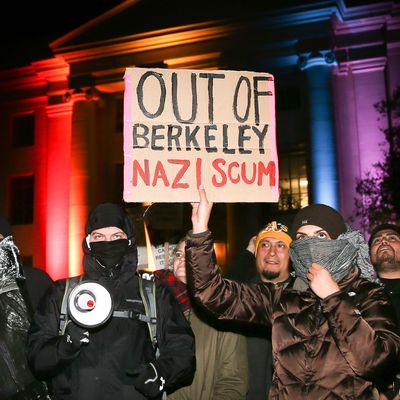
Since I started writing about the upsurge in illiberal left-wing thought two years ago, many of the responses have dismissed the phenomenon as the antics of silly college students, or just a series of isolated incidents that keep happening over and over for some reason. In reality, these episodes are the manifestation of a serious ideological challenge to liberalism — less serious than the threat from the right, but equally necessary to defeat.
In recent days, Howard Dean argued (referring, specifically, to conservative pundit and provocateur Ann Coulter, whose speech was threatened with cancellation by Berkeley administrators) that “hate speech is not protected by the First Amendment.” Aaron Hanlon, a professor writing for The New Republic defended “no-platforming,” the left-wing tactic of shutting down public speeches by objectionable figures. An even more elaborate defense of illiberalism comes from Ulrich Baer, vice-provost for faculty, arts, humanities, and diversity at New York University, writing for the New York Times op-ed page.
The liberal ideal sees free speech as a positive-sum good, enabling an open marketplace of ideas where, in the long run, reason can prevail. (And while reason may not always carry the day, if you compare the current state of affairs to 50, or 100, or 200 years before, the liberal model looks pretty good.) Left-wing critics of liberalism instead see the free-speech rights of the oppressed and the oppressors set in zero-sum conflict, so that the expansion of one inevitably comes at the cost of the other. Baer praises recent violent protests that halted speeches by Charles Murray and Milo Yiannopoulos as, therefore, “an attempt to ensure the conditions of free speech for a greater group of people,” actually enhancing freedom of speech. “When those views invalidate the humanity of some people, they restrict speech as a public good,” he argues.
But what kinds of speech should be shut down on these grounds? Baer’s definition is rather vague. “Some topics, such as claims that some human beings are by definition inferior to others, or illegal or unworthy of legal standing, are not open to debate because such people cannot debate them on the same terms,” he writes. So Baer wants his audience to believe that his rejection of free speech amounts to no more than preventing a handful of racist cranks from expressing highly noxious views on a handful of especially sensitive topics.
But which topics would qualify? In recent years, liberals have found race or gender buried within a wide and expanding array of subjects. Indeed, one increasingly popular formulation holds that identity issues cannot be abstracted from politics at all, since “all politics is identity politics.” That goes a bit farther than I’d put it — I propose that one could discuss the relative merits of a carbon tax versus cap-and-trade without addressing identity questions — but the point stands that the “sensitive identity issues” exception to the free-speech principle is a loophole with the capacity to swallow up the entire rule.
It is likewise highly doubtful that the need for repression would be limited to the right-wing fringe. A racist like Milo Yiannopoulos might seem like an easy case. Charles Murray is a harder case. Murray was targeted by protesters because of his work two decades before defending scientific racism in The Bell Curve (a work I’ve never read except in abridged form, and which has been persuasively, to me, demolished by scholars). But the speech he attempted to deliver at Middlebury College before being shut down by a mob was not on that topic. Indeed, when some scholars distributed a copy of Murray’s speech to 70 college professors, omitting the name of the author, they deemed it quite moderate. Even assuming his Bell Curve work does not merit free-speech rights, should that subject any future speeches of his to suppression?
Nearly all American politicians in both major parties support some limits on legal immigration, and some measures to enforce those laws. Virtually all of them define “some human beings as ‘unworthy of legal standing’” — a position Baer insists does not deserve to be defended in public at all. Perfectly cogent arguments can and have been made that, say, Hillary Clinton advocates systemically racist policies or that Bernie Sanders encourages sexism. The ability to associate disagreeable ideas with the oppressor, and to quash free speech or other political rights in the name of justice for the oppressed, is a power without any clear limiting principle. Historically, states that rule on that basis tend to push that power to its farthest possible limit.
The debate has largely centered on campus free-speech battles because academia is one of the few subcultures in American life where the left can wield hegemonic power. But the problem is ideological, not generational, and one can find signs of the phenomenon creeping out into other corners of political life. The illiberal left has used the fear of Donald Trump to goad broader elements of the progressive movement to adopt their repressive methods and slogans. The slogan “shut it down!” has come into fashion on the left. Protesters caused the cancellation of a Trump rally last summer, and were seen chanting “shut it down!” at a conservative think tank this week.
The illiberal left has brought its notion that opposing views can and should be shut down into wide circulation. It has disproportionate influence within the progressive movement, but remains, for now, a noisy minority. But noisy minorities — like the cranks and kooks of the far right who had been, 60 years ago, banished to the margins of Republican politics — have a way of developing over time into majorities, unless they meet forceful opposition.






























